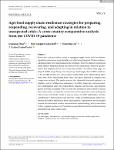Agri‐food supply chain resilience strategies for preparing, responding, recovering, and adapting in relation to unexpected crisis: A cross‐country comparative analysis from the <scp>COVID</scp>‐19 pandemic
| dc.contributor.author | Zhao, G | |
| dc.contributor.author | Vazquez‐Noguerol, M | |
| dc.contributor.author | Liu, S | |
| dc.contributor.author | Prado‐Prado, JC | |
| dc.date.accessioned | 2023-09-29T15:21:01Z | |
| dc.date.available | 2023-09-29T15:21:01Z | |
| dc.date.issued | 2023-09-25 | |
| dc.identifier.issn | 0735-3766 | |
| dc.identifier.issn | 2158-1592 | |
| dc.identifier.uri | https://pearl.plymouth.ac.uk/handle/10026.1/21346 | |
| dc.description.abstract |
Researchers and practitioners insist on equipping supply chains with the adaptive capability to return to a more desirable state after being disrupted. Various resilience capabilities have been emphasized in the literature; however, limited research has linked them to resilience phases and cultural value orientations. Moreover, preparedness and adaption phases have hardly been studied. To address these gaps, we adopted middle‐range theory to investigate agri‐food supply chain (AFSC) resilience to the COVID‐19 crisis in a cross‐country setting. Data were collected from interviews with AFSC practitioners from China and Spain, followed by thematic and comparative analyses. The results indicate that frequently discussed resilience capabilities, such as collaboration, redundancy, flexibility, leadership, and innovation, were implemented across the preparedness, response and recovery, and adaption phases; however, successful AFSC recovery also depends on each country's cultural value orientations. A hierarchical cultural orientation generates sense‐making and collectiveness and further leads to synergy across all AFSC stakeholders, thereby contributing to AFSC response and recovery. Under an egalitarianism cultural orientation that places self‐interest ahead of group goals, organizations are encouraged to make decisions based on their own situational understanding, which contributes to their response and recovery. This study also provides theoretical contributions and managerial and policy implications. | |
| dc.language | en | |
| dc.publisher | Wiley | |
| dc.subject | agri-food supply chain resilience | |
| dc.subject | cross-country comparative analysis | |
| dc.subject | middle-range theory | |
| dc.subject | resilience capability factors | |
| dc.subject | two cultural value orientations | |
| dc.title | Agri‐food supply chain resilience strategies for preparing, responding, recovering, and adapting in relation to unexpected crisis: A cross‐country comparative analysis from the <scp>COVID</scp>‐19 pandemic | |
| dc.type | journal-article | |
| dc.type | Article | |
| dc.type | Early Access | |
| plymouth.issue | 1 | |
| plymouth.volume | 45 | |
| plymouth.publication-status | Published | |
| plymouth.journal | Journal of Business Logistics | |
| dc.identifier.doi | 10.1111/jbl.12361 | |
| plymouth.organisational-group | |Plymouth | |
| plymouth.organisational-group | |Plymouth|REF 2021 Researchers by UoA | |
| plymouth.organisational-group | |Plymouth|Users by role | |
| plymouth.organisational-group | |Plymouth|Users by role|Academics | |
| plymouth.organisational-group | |Plymouth|REF 2021 Researchers by UoA|UoA17 Business and Management Studies | |
| dcterms.dateAccepted | 2023-09-05 | |
| dc.date.updated | 2023-09-29T15:20:49Z | |
| dc.rights.embargodate | 2023-10-3 | |
| dc.identifier.eissn | 2158-1592 | |
| dc.rights.embargoperiod | forever | |
| rioxxterms.versionofrecord | 10.1111/jbl.12361 |


